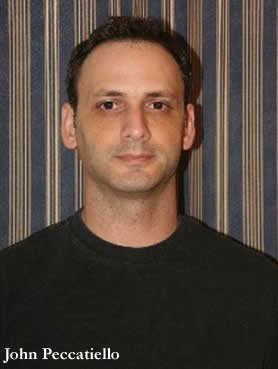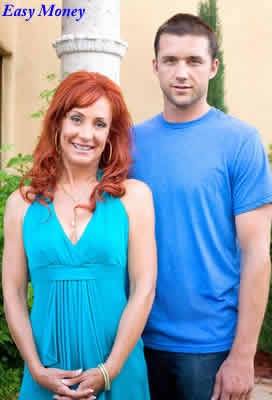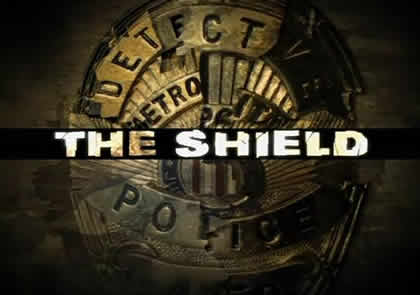 John Peccatiello’s career started as a guitar player back in Chicago in the late 80’s early 90’s. After a 3 year break John then moved to California in 1998 to attend audio school at The Los Angeles Recording Workshop. After graduation John was asked to be a teacher. While working at the school, he met current Alice Cooper bass player Chuck Garric. At the time Chuck was the bass player for LA GUNS and the band needed a guitar tech for an upcoming tour. Taking this job allowed John to tour the country for over three years and enabled him to work with bands such as Poison, Ratt, Great White, Tesla, Bar 7, Gilby Clarke, and Incubus.
John Peccatiello’s career started as a guitar player back in Chicago in the late 80’s early 90’s. After a 3 year break John then moved to California in 1998 to attend audio school at The Los Angeles Recording Workshop. After graduation John was asked to be a teacher. While working at the school, he met current Alice Cooper bass player Chuck Garric. At the time Chuck was the bass player for LA GUNS and the band needed a guitar tech for an upcoming tour. Taking this job allowed John to tour the country for over three years and enabled him to work with bands such as Poison, Ratt, Great White, Tesla, Bar 7, Gilby Clarke, and Incubus.
After the tour ended John started his post production career, working for a company called Sonic Surgery in Burbank. John got to work on shows with The District, Nash Bridges, and The Shield, as a sound editor. While at Sonic, John received his first award nomination for sound editing for Nash Bridges. In 2004 Sonic merged with Larson Studio in Hollywood, where John is currently working.
Bijan Tehrani: I believe that you had a nomination for an Emmy Award this year?
John Peccatiello: My sound mixers were nominated for a half hour comedy, “Weeds”.
BT: Tell me a bit about your background in post-production. When did you start working in post-production, and what projects have you been involved in?
JP: I started in 2000 as a runner/spotter. I worked my way up to editing, which then led me to effects editorial. I started off on “Nash Bridges”. If you can learn to work on that show, all the other shows that follow are easier, because it was a very busy effects show. I got to learn from top editors that are in the business today, guys that work on “CSI” and other sound heavy shows like that.
BT: Please tell us about some of the other projects that you were involved in. What was the biggest challenge you had to work with? 
JP: The biggest challenge was “The Shield”. The challenge with regards to sound was that they wanted it to feel like the show “Cops”. In TV and Film it is very easy to make something sound very Hollywood, very over the top. But when you have a show that wants to sound real it is actually harder, because you gotta look at it as if it isn’t an added sound effect, it needs to look like it matches production.. The show itself was so action heavy that you wound up spending way more time then you thought you would need to. The challenges also helped because it allowed me to learn more, versus dealing with an easy show that doesn’t really teach you anything.
BT: How do you see the changes in the way that post production work is being done over this past decade? Computers were introduced two decades ago, but new tools are changing things very quickly. Is it hard to keep up with the changing technology?
JP: Well, I still consider myself relatively young at the age of 37. I wasn’t a computer guy when I got into this, so having to learn computers was a big challenge. Since I have been doing this for ten years I have seen how much the computer has taken over, and unfortunately it has left a lot of very good editors out to dry. They don’t have the ability to keep up as fast as the computers are going. For me it is very challenging because every time you learn something, six months later you have to learn it on another piece of gear, or the gear that you are using updates itself. The shortcuts that you were using to get you through quickly have changed, and that can set you back. Plus the money thing, every time you have to upgrade it costs money. The computers have taken over, it is mostly computers, and it allows shows to have fixes and editing done quickly. But on the other side of that it is also making us have to work a lot quicker than we normally would. I believe average time for editing a TV show – like in the eighties and earlier – I think it was up to two weeks, and now you are given anywhere from a couple of days to maybe a week.
 BT: The great filmmaker from France, Jean-Luc Goddard, believes that the new technology, especially when it comes to editing picture and sound, when you have to move very quickly from one point to another, you miss? the whole feel of the work. He feels that in the analog format you had a chance to get a better feel of what you wanted to do. Do you think that is true?
BT: The great filmmaker from France, Jean-Luc Goddard, believes that the new technology, especially when it comes to editing picture and sound, when you have to move very quickly from one point to another, you miss? the whole feel of the work. He feels that in the analog format you had a chance to get a better feel of what you wanted to do. Do you think that is true?
JP: I am going to say yes, because what I am finding for myself is that I tend to go a lot quicker because I am not given the amount of time I would like. When you have a library of sounds, you are not always going to have just one sound. If it is a punch, there might be five to ten or more punches in that file. Because you can simply find the one you want, click it and move on. When they had to cut from tape you had to listen to the whole thing, and you had to listen and feel which ones were good and which were bad, instead of just clicking through.
BT: I was speaking to a gentleman who is a sound engineer working in France, and he was telling me that working on the sound for films over there is a lot more difficult than the work done in Hollywood. He said that in a Hollywood movie everything has to be perfect, and that takes a lot of time, but because everything is exaggerated, that makes things easier. In France he said that they have to be very faithful to the real sound, which has to be recreated, which makes it very difficult.
JP: It does. It is like “The Shield”. It was more difficult to work on because you couldn’t pick a lot of the sounds you wanted. The first few seasons they actually wanted the city ambiences? ambulances? to not have horns, so now you can’t make LA sound like LA. That’s like having a New York scene where they don’t want any horns or break squeals. You gotta be creative, and that’s a good thing. Once you know how to recreate it for real, then you should know how to enhance it from there, because at that point it is just adding sounds to make it better. It is so much harder to keep it true to its form, especially when you don’t have the exact sound you want.
BT: Has your background as a musician helped you in your post-production work?
JP: Well not just being a musician, I was also a welder; I have worked in warehouses and have done construction. So when it comes to sounds I have them all in my head. So when it comes to enhancing something, I can get to these sounds quickly because I have those pictures in my head. Sound works much better for me, I do much better as a sound effects editor than I do as a dialogue editor.
BT: Do you believe that something young people may be missing out on today is their experience with nature and their surroundings?
JP: Yeah, and I am also seeing now that unless you are working at a big facility, most of the time editors are working at home. I work at home, which is great, but the problem with that is that I don’t have that experience around. A  common phrase is that you need those old school guys, those guys who cut in the 70’s, 80’s, and 90’s. They have so much experience to give, and it is a shame you can’t get it. In the TV world the show comes in, you have x amount of days to edit, and boom it has to be on a dub stage, and then you either have one or two days to mix that show. We don’t have any pre-dubs, it goes to the dub stage and you are have what they wanted, or you are going to spend the whole day running up and down the stairs adding new sounds. Some producers are very good and easy to work with, and some just completely go off in the other direction when the show gets to the dub stage.
common phrase is that you need those old school guys, those guys who cut in the 70’s, 80’s, and 90’s. They have so much experience to give, and it is a shame you can’t get it. In the TV world the show comes in, you have x amount of days to edit, and boom it has to be on a dub stage, and then you either have one or two days to mix that show. We don’t have any pre-dubs, it goes to the dub stage and you are have what they wanted, or you are going to spend the whole day running up and down the stairs adding new sounds. Some producers are very good and easy to work with, and some just completely go off in the other direction when the show gets to the dub stage.
BT: Another thing that is lacking these days is interaction, including interaction between people who are in the same business. That could add a lot to the quality to the work.
JP: Sound editors by nature are not very social people. I happen to think that I am blessed; I think I am very social, and I get a lot of good criticism for that. When my shows mix I want to be there. A lot of sound editors don’t have to be there. I like to know what the producers are saying, what they like and don’t like. When they ask for different stuff that is the time to learn. Sometimes you are a little agitated because your work gets picked apart, but in the long run you look back and usually tend to go off with your supervisor and realize that some of the stuff was good and some was bad. Interaction is very important. You have to learn. Anybody can cut. Anybody can cut dialogue and effects, but not everybody is good at it. The good ones are that small group of people that are working everyday and not having to go out and do a second job.
BT: Any future projects in the works?
JP: Well, I am currently working on a small budget film right now, and I just got on a new TV show called “Easy Money” on the CW Network. It is from the writers of “The Sopranos”. The small movie I am working on is called “Lunatics, Lovers, and Poets”.

